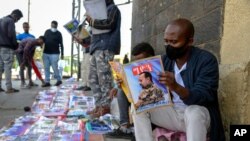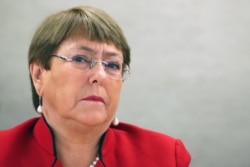The Ethiopian Parliament has appointed a new leader for the restive Tigray region after the region’s president and leaders of the ruling Tigray People’s Liberation Front (TPLF) were stripped of their immunity from prosecution, Prime Minister Abiy Ahmed announced Friday.
Mulu Nega, 52, was appointed to replace ousted Tigray President Debretsion Gebremichael. Abiy’s government has issued arrest warrants for the removed Tigray officials.
For more than a week, the Ethiopian army has clashed with forces of the local government in the troubled region. The violence displaced at least 11,000 civilians who have fled to neighboring Sudan.
Earlier this week, Amnesty International reported that hundreds of civilians were stabbed or hacked to death at an incident in Mai-Kadra in southwest Tigray. Tigray forces have denied being behind the alleged massacre.
Tigray, the northernmost of Ethiopia’s nine regional states, defiantly held elections in September from which Debretsion emerged the leader, despite the prime minister’s decision to delay the voting, citing the COVID-19 pandemic.
Ethiopia’s government took military action against Tigray after the region’s forces attacked a military camp of federal troops November 4, according to the prime minister. The TPLF denied the attack.
The regional administration has been displeased by Abiy’s political reforms, which they call a unitary system of government. Debretsion, who served in the federal government and was once deputy prime minister, says the Tigray region is overlooked by the Abiy administration.
The U.N. High Commissioner for Human Rights, Michelle Bachelet, said this week that she was disturbed by the killings reported by Amnesty. Her spokesperson, Rupert Colville, said the High Commissioner wanted a full inquiry into the incident.
“If confirmed as having been deliberately carried out by a party to the current fighting, these killings of civilians would of course amount to war crimes, and there must be an independent investigation and full accountability for what has happened,” Colville said.
He added that Bachelet said the “first priority right now must be to stop the fighting and prevent any further atrocities from taking place.”
The High Commissioner through her spokesperson warned that a “protracted internal conflict will inflict devastating damage on both Tigray and Ethiopia as a whole, undoing years of vital development progress,” which could potentially destabilize parts of East Africa.
The violence has worsened the ethnic tensions that have existed in the East African nation for the past two years, according to two high-level U.N. officials who said the situation is precarious. Pramila Patten and Karen Smith in a news release said ethnic and religious discrimination has reached alarming levels and constitute a recipe for genocide as well as “a serious threat to internal and regional stability.” They warned that these should “immediately be addressed to avert further escalation of widespread violence.”






